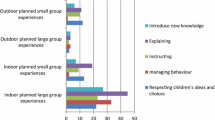Abstract
Meaningful group times have been a hallmark of quality early childhood programs for many years. Stimulating group experiences present a wealth of opportunities for everyone involved. Adults are better able to monitor children's skills and enjoy their ongoing growth. Group activities also may set the stage for an abundance of adventures as young children grow and learn in all areas of their development (Bredekamp, 1986).
Similar content being viewed by others
References
Bredekamp, S.Developmentally Appropriate Practice. Washington, DC: National Association for the Education of Young Children, 1986.
Genishi, C. Acquiring Language and Communicative competence. In C. Seefeldt (Ed.),Early Childhood Curriculum: A Review of Current Research. New York: Teachers College Press, 1986.
Gottfried, A. Research in Review: Intrinsic Motivation in Young Children.Young Children 1983,39, 64–73.
Kami, C. Leading primary education toward excellence: Beyond worksheets and drills.Young Children 1985,40, 3–9.
Maccoby, E.Social Development: Psychological Growth and the Parent-Child Relationship. New York: Harcourt Brace Janovich, 1980.
Marion, M.Guidance of Young Children (2nd ed.). New York: Wiley, 1985.
Mueller, E., & Lucas, T. A Developmental Analysis of Peer Interaction Among Toddlers. In M. Lewis, & R. Rosenblum (Eds.),Friendship and Peer Relations. New York: Wiley, 1975.
Nicosea, R., Willowghby, M., & Hatcher, B. Strengthening Family Ties in Play Settings. In J. Frost, & S. Sunderlin (Eds.),When Children Play. Wheaton, MD: Association for Childhood Education International, 1985.
OBrien, S. Early Learning Guidelines.Childhood Education 1988,65(1), 14–17.
Schickendanz, J., Schickendanz, D., & Forsyth, P.Toward Understanding Children, Boston, MA: Little Brown, 1988.
Yarrow, M., Scott, P., & Waxler, C. Learning Concern for Others.Development Psychology 1973,8, 240–260.
Additional information
Pauline Davey Zeece and Marcia Corr are at the Department of Human Development and the Family, University of Nebraska-Lincoln in Lincoln, Nebraska.
Rights and permissions
About this article
Cite this article
Zeece, P.D., Corr, M. Group time treasures: Implications for learning. Early Childhood Educ J 17, 32–34 (1989). https://doi.org/10.1007/BF01619652
Issue Date:
DOI: https://doi.org/10.1007/BF01619652




